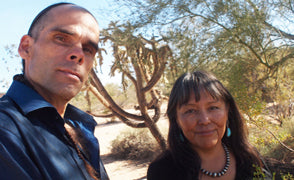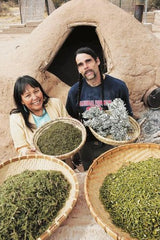Community Values Give Native Businesses an Edge
By Jamie Miller, Special to Tribal Business News
September 14, 2025
Indigenous entrepreneurs and Native-owned institutions that support them are building successful businesses by prioritizing community impact and cultural preservation over pure profit—continuing a tradition of commerce that dates back centuries.
Virginia Boone prays before she gathers plans in the Arizona desert, a ritual rooted in her Navajo family's healing traditions. What began with her father's search for peace after World War II has grown into Medicine of the People, the Tucson-based herbal medicine business Boone has carried forward for more than three decades.
"All I'm trying to do is be real," Boone said. "I'm just gonna keep it going as long as the Creator helps me in the direction that is safe for the people and safe for me and the plants."
For Boone and for a growing number of Native business owners, business has never been about only the bottom line. It's about stewardship — protecting the land, preserving culture, and serving community.
Authenticity as Advantage
Building a business model around the Native values of community and preservation has always been Virginia Boone's approach for Medicine of the People.
Boone's father founded the business after looking to his Navajo ancestry for healing while recovering from World War II. He found peace walking among the plants and began practicing herbal medicine in Arizona, where Boone and her siblings live today. When her father walked on in 1990, Boone expanded her father's legacy by bringing authentic herbal medicine to Navajos and beyond.
Carrying that responsibility forward, Boone said she became determined to protect authentic Native medicine from being diluted or misrepresented. She didn't want so-called "Pretendians" — people falsely claiming Native identity — to be recognized for traditions that weren't real.
She grew her business through "networking" the Native way — laughing and crying alongside clan members, traveling to powwows and building relationships. Some of those early powwow customers are still buying from her today.
Her approach has always been true to her Native values, operating with respect for the earth, with particular concern for how plants are being impacted by climate change. When she and her sisters gather herbs, they are mindful of their connection to the land.
"My sisters and I, when we go gathering, we pray and pray and cry and cry," Boone said.
That connection — and commitment — has become one of the differentiators for the company in the broader market. Long before "sustainability" became a corporate buzzword, Medicine of the People built its reputation on it. In an era when 70% of consumers saying they prefer buying from socially responsible companies, Boone's authenticity continues to resonate with customers worldwide.
"Customers are responsive to the cultural aspects of the products…we have thousands of people writing us notes on the internet. It is so crazy, beautiful, lovely and inspiring, every day," says Boone.
Boone's story is not entirely unique. Across Indian Country, Native entrepreneurs are finding that community values can be a strategic advantage. But translating those values into business practices is not always simple.
For many Native entrepreneurs, especially those based on reservations or in rural areas, running a company means facing barriers that others rarely encounter — unreliable infrastructure, limited shipping and broadband options, and the higher costs of operating in remote markets. Those challenges make access to capital and tailored financial support all the more critical.
Originally published in Tribal Business News
- Virginia Boone



